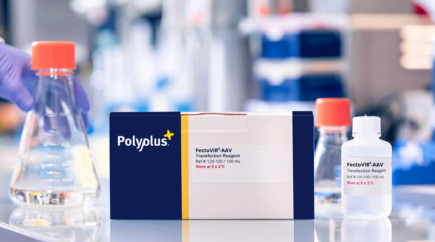Available at research and GMP grade to intensify production of recombinant AAV rAAV viral vectors at any scale from benchtop to 2000L scale bioreactor...

Gene therapies are complexmolecules and require higher volumes of drug product. To create scalable processes that can treat indications that affect large patient populations via systemic administration of high-dose formulations, it is becoming increasingly imperative to design processes right the first time. Accounting for quality and scalability into viral-vector manufacturing processes from the outset is not only more efficient, but also essential to enabling the cost-effective production of large quantities of gene therapies. On June 19th 2022, a webinar hosted by Cell and Gene Therapy Insights and presented by myself and Hanna Lesch, Ph.D., Chief Technology Officer at Exothera, covered approaches to overcoming current issues limiting the available capacity for viral-vector manufacturing and thus making gene therapies accessible to more patients. We discussed the ways in which two fundamental actions are being taken at Polyplus and Exothera: process optimization and scaling.
An overview of the webinar content follows, to watch the full episode, click here.
Viral vector manufacturers are looking for ways to leverage existing and new platforms with fit-for-purpose reagents (cell lines, plasmid DNA [pDNA], media, transfection reagent) to identify and optimize critical process parameters across all unit operations. Both upstream steps like transient transfection and the various downstream purification, final formulation, and fill/finish steps have deep impacts on process economics.
Polyplus is working to make viral vector manufacturing more cost-effective and scalable with enabling products and services. The 2021 launch of FectoVIR®-AAV transfection reagents and kits was designed to accommodate research to GMP-grade production of adeno-associated virus (AAV) vectors in suspension culture. Compared to traditional PEI-based transfection agents, users can see up to 10-fold increase in titers. Even compared to the advanced PEIpro® reagent for adherent and suspension AAV and lentiviral (LV) processes from Polyplus, FectoVIR®-AAV affords a two-fold increase in titer.
With more stability, longer transfer times for the pDNA-reagent complex are achievable with less shear stress and reduced risk for degradation. The greater stability also makes it possible to achieve reproducible functional titers with the working volume of the pDNA-reagent complex solution reduced from 10% with PEI-based reagents to as little as 1%.
Still, transfection is only one piece of the puzzle. The cell line, media and plasmids are also crucial. Polyplus recently acquired e-Zyvec and its unique plasmid engineering technology to provide both tailored plasmid solutions and fit-for-purpose transfection reagents.
Exothera, a full-service contract development and manufacturing organization (CDMO) from Univercells Group, was founded in 2020 to help address the challenges that manufacturers of advanced therapies face with respect to lack of capacity and bioprocessing experience.
If a customer is seeking to optimize process parameters, such as the ratio of plasmid DNA to transfection reagent, the choice of media, temperature, etc., a design-of-experiment (DoE) approach can be highly effective for screening multiple process parameters simultaneously. Exothera is structured for a right-first-time approach to viral-vector manufacturing, investing upfront in plasmid construct design and cell-line development and the establishment of a production strategy that considers scalability, regulatory compliance and testing requirements and process economics from the outset.
Double the Production, Lower the Cost
Just a two-fold boost in titer can have a dramatic impact on the number of doses that can be produced in existing equipment. For a product like Zolgensma® (onasemnogene abeparvovec-xioi), Novartis’s treatment for babies born with the neurodegenerative disease spinal muscular atrophy, a dose of which comprises 8.8 x 1014 viral genomes (VG), using FectoVIR-AAV would enable production of 328 rather than 118 doses in a 2000 L bioreactor assuming a doubling of the titer. Twice as much product being made using less raw material, consumables, and labor, can make the gene therapy more affordable.
With access to Univercells Technologies’ scale-X™ fixed-bed bioreactor platform, which includes the hydro (cell growth areas of 2.4 m2), carbo (10–30 m2) and nitro (200–600 m2) systems, Exothera can implement adherent processes from lab to production scale. Similarly, suspension processes can be performed in Pall Allegro™ STR bioreactors from 200 L to 2000 L after starting in Corning® Erlenmeyer Shake Flasks (several hundred mL) and moving to Eppendorf DASGIP® Bioblock Stirrer Vessels (up to 2.0 L) and then the Eppendorf BioFlo 320 Bioprocess Control System (up to 40 L).
These technology platforms support viral-vector manufacturing via transient transfection of plasmid DNA. Studies at Exothera have demonstrated that similar results for AAV and LV transfection processes can be achieved in flatware and scale-X hydro fixed-bed bioreactors. Similarly, a PEIpro®-mediated AAV suspension transfection process behaved similarly when performed at lab scale and in a 500 L Pall Allegro STR bioreactor.
With these platforms, it is possible for Exothera to better implement its right-first-time approach to viral-vector process development and thereby improve both patient access and patient safety.
The Polyplus promise is delivering solutions that power science. A commitment to collaborating with industry leaders to develop fit-for-purpose transfection reagents and tailor-made plasmids marries well with this right-first-time approach to the development of robust and scalable viral-vector manufacturing processes. These types of solutions are helping to address the manufacturing hurdles that must be overcome if affordable gene therapies for the treatment of diseases such as are to be commercialized.
Both FectoVIR®-AAV and PEIpro® transfection reagents and kits are available in research and GMP grades to support smooth transitions from the lab to commercial manufacturing and ensure compliance with regulatory expectations for high-quality raw materials. HPLC residual testing methods developed by Polyplus are also available to demonstrate that no residual transfection reagent remains in final products.
Author: Julien Depollier, PhD, Director Strategic Partnerships at Polyplus